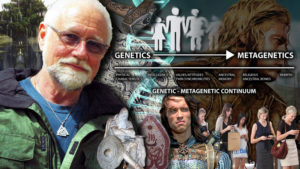
Gothi Stephen A. McNallen, Alsherjargothi of the Asatru Folk Assembly, coined the term Metagenetics in 1980[1] to refer to the link between spirituality and heredity,[2] and later in 2006 published the 25 page booklet, The Philosophy of Metagenetics, Folkism and Beyond, “revised and updated from articles appearing over a span of years in Runestone magazine”, to elaborate on this subject. This is especially relevant when considering the
folkish nature of Native Faith
.
This 2006 publication is billed as “an essential resource for all interested in the Folkish viewpoint”, which also includes a suggested reading list. Amongst other highly informative pieces that relate in this booklet, it features the article, Metagenetics[5] – revised from an original article published in the Winter, 1980 issue of The Runestone, and the article, Genetics and Beyond: The Ultimate Connection,[6] which further elaborates on the concept of Metagenetics – adapted from an article appearing in the Summer, 1999 issue (#26) of The Runestone.[7] This second piece consists of “significant additions.”[8]
When looking into Metagenetics seriously, whether you agree with it or not, it is strongly advised that you read the updated and expanded 2006 booklet, The Philosophy of Metagenetics, Folkism and Beyond, listen to the July 4th 2014 radio interview that McNallen has given on the subject, and, of course, read Asatru: A Native European Spirituality, 2015, before making any comment or judgement on the subject.
It may also interest you to note that Dr. Stephen E. Flowers, Ph.D. (Edred Thorsson) has also written on the topic of Metagenetics, ‘fleshing it out considerably’[10] along with some newer news article written on the subject by others.[11]
“For different people , there are different ways to God.”
“I have been and still am a seeker, but I have ceased to question stars and books; I have begun to listen to the teaching my blood whispers to me.”
– Hermann Hesse, from the Introduction to Die Geschichte von Emil Sinclairs Jugend, Fischer Verlag, 1919
As Stephen A. McNallen has said, “Science continues to validate the folkish viewpoint.”[12]
* McNallen, Stephen A.; The Philosophy of Metagenetics, Folkism and Beyond, AFA, 2006, p. 10. (Available
).
* McNallen, Stephen A.; “How the Gods Came to North America”, Asatru: A Native European Spirituality, Runestone Press, 2015, p. 64. (available from Amazon.com (
) and Arktos in the UK (
).
* McNallen, Stephen A.; “How the Gods Came to North America”, Asatru: A Native European Spirituality, Runestone Press, 2015, p. 81. (In the glossary to this book, words are slightly changed for the Metagenetics entry, and shown here in [ ]: “the hypothesis [principle] that there are spiritual and metaphysical implications to physical relatedness among humans which correlate with, but go beyond [transcend], the known limits of genetics.”)
3
* McNallen, Stephen A.; The Philosophy of Metagenetics, Folkism and Beyond, AFA, 2006, p. 5.
*
(for some reason this says 1985. This may be in relation the publication year of this particular version of the piece, but this article dates from 1980 – see note 1). McNallen has also commented, which adds to the confusion, that he wrote the article in 1985 – see McNallen, Stephen A.; “How the Gods Came to North America”, Asatru: A Native European Spirituality, Runestone Press, 2015, p. 81. However, we find, as per note 1, that it was 1980. As stated, the above may simply be the date of publication for that particular version, and the reference to 1985 in his 2015 masterpiece, Asatru: A Native European Spirituality, may simply be a typographical error. As an example of it being published at an earlier date to 1985, besides those referenced in the above mentioned note 1, see McNallen, Stephen A.; An Odinist Anthology: Selections From The Runestone, p. 21, AFA, published 1983.
* McNallen, Stephen A.; The Philosophy of Metagenetics, Folkism and Beyond, AFA, 2006. (Available
).
Chapters include,
;
; Metagenetics (see note 3, above; Genetics and Beyond (see note 6, above);
In Defense of the Folkish View
; Conclusion, and Suggested Readings.
* Youtube: https://youtu.be/B546mQQZ-sE
10
* Primarily in an Idunna article (
), then somewhat in a chapter of A Book of Troth (
), an (less directly) in a talk given to the Pagan Student Alliance (
). Source: Kaplan, 1997. p. 83.
11
*
Does Genetic Memory play a role in folkish traditions?
by Lena Svensson,
Grandma’s Experiences Leave a Mark on your Genes
(
) by Dan Hurley,
Parental olfactory experience influences behaviour and neural structure in subsequent generations
by Brian G. Dias and Kerry J. Ressler,
Do We Choose Our Friends Because They Share Our Genes
by Rob Stein,
Phobias may be memories passed down in genes from ancestors
by Richard Gray, and
Study of Holocaust survivors finds trauma passed on to children’s genes
by Ewan Birney.
12
*
